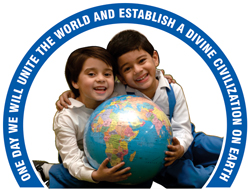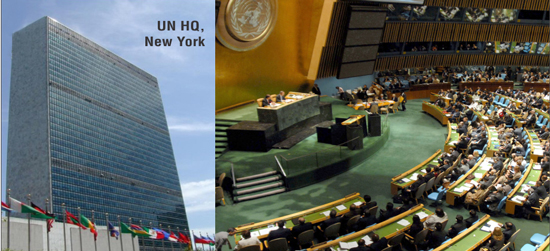
Personality Development
CMS creates a better future for all children by maximising
their opportunities through quality education and initiatives for unity and development.
November 2018

Pandit Jawahar Lal Nehru
(i) On 13th December, 1946, Pandit Jawahar Lal Nehru moved an Objective Resolution in the Constituent Assembly which was passed on 22nd January, 1947. The seed of Article 51 was sown in that Objective Resolution in the part relating to International Relations.
(ii) When the Constitution was being drafted, in the Draft Constitution, the said Article was included as Article 40 which related to International Peace & Security and India's international relations.
(iii) Amendments were moved on Draft Article 40 and after a lot of discussions and debates, Chairman of the Drafting Committee of the Constitution - Dr. B. R. Ambedkar, accepted the Article in the present amended form, which was finally passed by the Constituent Assembly and is numbered as Article 51 of the Constitution of India in the form mentioned below: (It became the Law of the Land on 26th January, 1950)

Dr. B. R. Ambedkar
*Article 51 Of The Constitution Of India
- promote international peace & security;
- maintain just & honourable relations between nations;
- *foster respect for international law ...; &
- encourage settlement of international disputes by arbitration.
The above Article 51 is included in Part IV of the Constitution of India relating to Directive Principles of State Policy, which were initially considered as not enforceable. But the position was changed by 25th Amendment 1971 of the Constitution which upgraded the status of Directive Principles vis-a-vis Fundamental Rights and further augmented by rulings of the Supreme Court, which are as follows

1. 25th AMENDMENT ACT - 1971:
Article 31-C, added by the Constitution (25th Amendment) Act, 1971, seeks to upgrade the Directive Principles. If the Directive Principle aim at promoting the larger interest of society, the courts will have to uphold the case in favour of Directive Principle in case of conflict with Fundamental Rights.
2. Ruling Of Supreme Court In 1973:
Ruling of the Supreme Court in the case of Kesavananda Bharati vs. State of Kerala in which it is ruled that
(a) 'Moral Rights' embodied in Part IV are as equally essential features of the Constitution as Fundamental Rights and are fundamental in the governance of the country and all the organs of the state are bound to enforce those directions.
(b) The Directive Principles act as a check on the government; theorized as a yardstick in the hands of the people to measure the performance of the government. Therefore, the government should keep these principles in view while framing laws and planning its activities and actions as these principles are fundamental in the governance of the country and it shall be the duty of the state to apply these principles in making laws.
We, the peace loving people of India and 2.5 billion children of the world (including the children of India), have been watching helplessly for the past 68 years (since commencement of the Constitution of India in 1950).
During the all these years no endeavour has been made to follow the mandate of Article 51 of the Constitution of India. It is now becoming unbearable to experience further agony, fear, anxiety and terror any longer.
Terrorism, fear of more wars, ecological imbalance and insecurity among the human race is prevalent in the present World scenario. We, the citizens of India, are now losing patience and cannot wait till eternity to fulfill the wishes and dreams of Mahatma Gandhi and Pt. Jawahar Lal Nehru and all the members of the Constituent Assembly.
Appeal To The Government Of India
- Since no endeavour has been made in past 68 years, a full fledged endeavour is needed, as intended in Article 51 ("shall endeavour") by nothing less than calling a meeting at New Delhi, India of all the leaders of the world, as India alone cannot fulfill the dictates of Article 51.
- We have requested the Government of India to consider implementing Article 51, in action and in spirit, by calling a meeting of World Leaders for providing a safe and secure future to world's over two billion children and the generations yet-to-be-born, to deliberate on the formation of a NEW POLITICAL AND ECONOMIC ORDER OF THE WORLD (on the pattern of the European Parliament of 28 countries and European Currency 'EURO' of 18 countries.
- The 53rd Session of the UN General Assembly held on 10th May, 1999 reflected a consensus to establish a New Political and Economic Order of the World and on 26th May 2000, Dr Jagdish Gandhi from India, also moved the same resolution in the UN Millennium Forum of 1350 representatives of NGOs &Civil Society Organisations of the world held at UN Headquarters in New York from 22nd to 26th May 2000, where over 1000 NGOs and civil society organizations also proclaimed that formation of a new political and economic order of the world was highly desirable. India is the only country in the world which has a constitutional mandate in Article 51 coupled with the philosophy of 'Vasudhaiv Kutumbakam' and 'Jai Jagat' propagated by Mahatma Gandhi and Vinoba Bhave and therefore, India must take early initiative in this direction to save the future of over two billion children of the world and the generations yet to be born.
"Mankind's problems can no longer be solved by National Governments, what is needed is a World Government and this can best be achieved by strengthening the United Nations System." -Jan Tinbergen
World Parliament for World Unity & World Peace

‘United Nations General Assembly must be turned into World Parliament to enact
World Laws.'
World Government for Global Governance, World Unity and World Peace

‘The United Nations Headquarters must be turned into the Secretariat of
World Government.’
Meeting of World Leaders
A meeting of world leaders must be called at New Delhi by Government of India as it is the largest mature democracy of the world. Article 51 of the Constitution of India is a mandate given to the Government of India to fulfill its inter-generational responsibility and save the future of mankind and the world's over 2.5 billion children and generations yet-to-be born, which are the common denominators of all the nations of the world.
- City Montessori School, Lucknow

Roshan Gandhi Forouhi
Director of Strategy, CMS
Message from
Mr Roshan Gandhi Director of Strategy, CMS
As I write this, I am flicking through the draft pages of this Bulletin, and seeing a huge amount of material related to the CMS annual conference of Chief Justices. The ideals of the conference are extremely grand – solving international problems through the creation of supra-national institutions of governance such as a World Court of Justice and a World Parliament – and, as a result, perhaps difficult to relate to. I therefore wish to use this short piece to make it feel more 'relatable'.
To understand the relevance of the conference, it is helpful to bear in mind the underlying values and motivations behind it. The conference has been conceived based on a notion that there are serious world problems that will impact future generations, and that these problems cannot be solved by any single government alone. Global issues that threaten the next generation – such as environmental degradation, or the spread of international terrorism – require global solutions, and this conference brings together influencers at the highest levels to deliberate on how institutions could be formed to provide those global solutions.
Of course, these grandiose ideas about global institutions of governance are not the only part of the solution to these problems. The types of international problems that this conference has been convened to tackle on a global level also require action at a local and individual level – and this is where everyone in their own capacity can relate to the values and motivations of the conference, and make a meaningful contribution towards the same aims.
As we deliberate upon rule of law at an international level, let us make a greater effort to respect and uphold the law at the level of our own communities, by being law-abiding citizens and working against systemic corruption. While we talk about creating a worldwide democratic system, let us work towards building well-functioning democratic processes here in our own national and state parliamentary constituencies, through taking the time to make informed voting decisions and interpretations of political news. When we discuss the creation of international institutions to tackle environmental problems, let us not forget our duty to minimise our own environmental impact at home. By thinking in this way, we may all meaningfully relate to the values and aims of the Chief Justices' Conference.